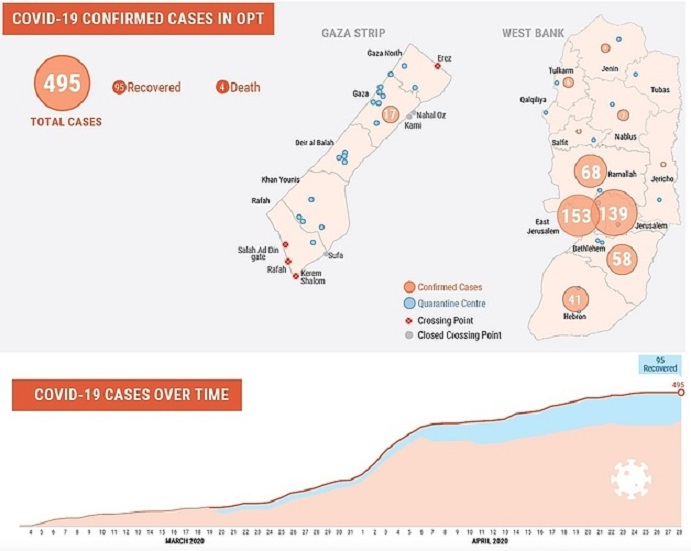UN Office for the Coordination of Humanitarian Affairs (OCHA)
Situation Overview
An additional 46 Palestinians were confirmed to have contracted COVID-19 in the oPt during the reporting period, including 33 in East Jerusalem, 11 in the reminder of the West Bank and two in the Gaza Strip, with no new deaths recorded.[1] This brings to 495, the total number of cases across the oPt as of 28 April, of whom four have died and at least 95 have recovered. The relatively large increase in caseload in East Jerusalem is attributed to the increase in the volume of samples tested, following the Israeli authorities’ establishment of new testing facilities in the Palestinian areas of the city over the past two weeks (currently ten facilities).
According to the Palestinian Ministry of Health (MoH), since the onset of the pandemic, nearly 28,000 laboratory samples have been tested and approximately 13,000 Palestinians are in quarantine at home, or in designated facilities for monitoring purposes.
Addressing the critical gaps in supplies needed to contain and manage the pandemic remains the main priority of the MoH and the humanitarian community. The main items required include testing kits, personal protective equipment (PPE), ventilators and essential Intensive Care Unit (ICU) equipment (see detailed table below). These gaps are the result of the fragile situation of the Palestinian health system, even before the crisis, exacerbated by global shortages since then.
The Palestinian Ministry of Education announced that schools will not reopen during the current academic year, which ends on 23 May; however, the next academic year is expected to start one month earlier. The 12th grade exam, the Tawjihi, will take place from 30 May onwards.
Following last week’s announcement by both the Palestinian and Israeli authorities about the relaxation of certain restrictions, economic activity has increased during the reporting period, particularly in the West Bank, including East Jerusalem. However, the socio-economic impact of the pandemic in the oPt is of increasing concern.
The World Bank estimates that due to the reduced demand caused by job losses and salary cuts the Palestinian economy will shrink in 2020 between 2.6 to 7.6 per cent compared to 2019, depending on the length of the restrictive measures. Moreover, the Palestinian Authority’s fiscal deficit as a result of the decline in revenues, along with the increase in expenditures to confront the pandemic, may reach up to US$2 billion. The UN Special Coordinator, Nikolay Mladenov, warned the Security Council that “if current trends continue, the damage to the economy risks the very existence of the Palestinian Authority.”
read the full report













